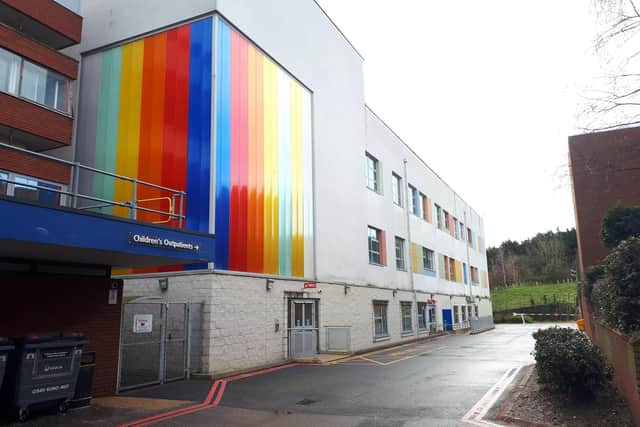Warning notice for KGH's children's services as they are rated inadequate by CQC
and live on Freeview channel 276
Inspectors say ‘immediate’ improvement is needed in the children and young people’s (CYP) services run by Kettering General Hospital NHS Foundation Trust after an inspection in December saw their rating drop from requires improvement to inadequate.
The Care Quality Commission (CQC) carried out an unannounced focused inspection after receiving information of concern regarding the safety and quality of CYP services at KGH.
Advertisement
Hide AdAdvertisement
Hide AdThe inspection included the paediatric assessment unit (PAU), Skylark ward and the neonatal unit.


CQC also inspected the paediatric emergency department (PED) in urgent and emergency care (UEC) services.
Due to concerns found at this inspection, CQC has taken enforcement action and served the trust with a warning notice regarding people’s safety and safeguarding issues.
This requires them to make immediate improvements, and the trust has provided CQC with an action plan outlining how it intends to address the areas of concern outlined in the warning notice.
Advertisement
Hide AdAdvertisement
Hide AdCharlotte Rudge, CQC deputy director of operations in the Midlands, said: “When we visited Kettering General Hospital, we found leaders understood the priorities and issues the services faced.


"However, some leadership roles were vacant impacting on the trust having effective oversight on the safety and quality of care people were receiving which was putting them at risk.
"These concerns resulted in CQC taking urgent action and issuing the trust with a warning notice to highlight areas where they must make immediate improvements."
What the CQC inspectors said:
“We found the trust had ineffective systems in place to assess and treat people at risk of sepsis.
Advertisement
Hide AdAdvertisement
Hide Ad"Staff didn’t ensure people received a timely assessment to determine if they were at risk of sepsis.
"Also, if they were at risk, they didn’t always receive treatment as quickly as they should have to help prevent them from coming to harm.
"We were informed of an incident where someone who developed sepsis hadn’t had a sepsis screen for over seven hours after arrival at the hospital which is totally unacceptable.
"Since the inspection, the trust has started to make changes to improve this.
Advertisement
Hide AdAdvertisement
Hide Ad“Inspectors found safety issues in both services we visited.
"The environment didn’t always keep people safe.
"For example, the layout of Skylark ward didn’t always support the safe management of people with mental health conditions or challenging behaviours.
"Most cubicles were close to each other, which meant it was easy for people to go in other people’s rooms and access equipment left lying around, which could put people at risk of harm.
“Also, there were concerns with the environment in the paediatric emergency department.
Advertisement
Hide AdAdvertisement
Hide Ad"The space wasn’t appropriate to manage the number of attendances, particularly at times of increased demand.
"For example, inspectors saw corridors and walkways full of children and parents or carers waiting to be seen.
“In an emergency, this could have impacted on staff not being able to effectively care for someone in urgent need of attention.
“Following the inspection, we reported our findings to the trust so its leaders know what urgent improvements must be made to keep people safe.
Advertisement
Hide AdAdvertisement
Hide Ad"We’ll inspect these services again to assess whether improvement have been made.
"If there’s insufficient progress or if people are at immediate risk of harm, we won’t hesitate to take further enforcement action.”
Response from KGH
Kettering General Hospital Chief Executive, Deborah Needham, said: “We accept the findings of today’s CQC report and the clear message it contains of the need to significantly improve the way we deliver children and young people’s services.
“I would like to sincerely apologise to any families who feel they have been let down by our services.
Advertisement
Hide AdAdvertisement
Hide Ad“Immediately after the CQC’s inspection in December we launched a comprehensive improvement programme to look at the issues raised and decide how we can resolve them.”
This is now well underway and here are some examples of progress they have already made:
- Moved the paediatric emergency department – which was under considerable space pressure – to a new larger area next to the adult emergency department
- Addressed core safe staffing levels in children’s services with a new monitoring process which enables staffing levels to be adjusted quickly and appropriately. They have also recruited to the children’s services teams, and new appointments include two new paediatric consultants and a new head of nursing
Advertisement
Hide AdAdvertisement
Hide Ad- Developed a strong focus on key safety processes such as sepsis management with a senior nurse driving improvement. They have delivered additional training and increased the frequency with which they check that staff are following our sepsis procedures. Recent checks show they are now achieving 100 per cent for initial sepsis screening across all areas
- Given more attention to fluid monitoring – with recent checks now showing 100 per cent compliance for fluid and hydration chart completion and initial assessment on Skylark Ward
- Given additional focus to identifying the deterioration of patients. Recent checks on vital signs assessments show they are now doing them at the right frequency 95 per cent of the time. Vital signs assessments are where staff measure a patient’s temperature, heart rate, respiratory rate, blood pressure, and oxygen saturation. They are used to help determine a patient’s condition and can help spot any deterioration in it.
- Improved medicines management – They have reviewed how they managed medicines and, for example, made sure they check trolleys used to store medicines more regularly and robustly to prevent medicines becoming out-of-date - consistently achieving 100 per cent compliance in recent checks
Advertisement
Hide AdAdvertisement
Hide Ad- Improved safeguarding – The CQC recognised that the trust’s ‘staff had training on how to recognise and report abuse and they knew how to apply it’ and ‘worked well with other agencies to do so’ – but found they needed to do more to protect children with mental health conditions. They are taking practical measures to ensure the ward is safe for all patients
New appointments to lead improvement programme
While current checks show high rates of compliance with the procedures the trust understands the need to embed improvements permanently and it has a new director of nursing, Jayne Skippen, and new medical director, John Jameson, who together are leading the improvement programme alongside other senior staff.
Jayne said: “The CQC found we have not always embedded improvements to our systems and processes and that is a major concern for us and an area we will continue to focus on.
“We are improving the way we oversee changes and how we assure ourselves that changes have been effective.
Advertisement
Hide AdAdvertisement
Hide Ad"We want to work with our staff, our patients and their families to develop good communication and a strong culture where safety comes first.
“One improvement we have already made is having a dedicated and experienced member of the trust’s Patient Safety Team working five-days-a-week on Skylark Ward to improve communication between staff and patients and their families.
"We hope this will help us resolve any issues of concern at an early stage.
"If you have any questions about your loved one’s care please speak to a member of our friendly team.
“Our improvement programme is a work in progress.
Advertisement
Hide AdAdvertisement
Hide Ad"We are fully committed to continuing to work with the CQC, our own teams, and our patients and their families, to ensure we provide safe and compassionate care for children and their families at all times.”
If people have concerns about our children’s services they can also raise them through the Patient Advice and Liaison Service on 01536-493305 or 01536-493306 or by email at kgh-
[email protected] with more information on our website https://www.kgh.nhs.uk/patient-
advice-and-liaison-service-pals/
In services for children and young people (CYP), CQC inspectors found:
- Not all staff had completed mandatory training including in the highest level of life support
Advertisement
Hide AdAdvertisement
Hide Ad- There was not enough nursing or medical staff, and they didn’t always effectively identify and quickly help people at risk of deterioration
- The service did not always control infection risk well
- The service did not always use systems and processes to safely prescribe, administer, record and store medicines
- Staff did not always feel respected, supported and valued. The service did not always have an open culture where people, their families and staff could raise concerns without fear
- Staff did not always have regular opportunities to meet, discuss and learn from the performance of the service. Leaders and teams did not use systems to manage performance effectively
Advertisement
Hide AdAdvertisement
Hide Ad- Risk assessments to continually identify ward based risks were not always effective. Actions to reduce the impact of risks were not always in place. The service did not always collect reliable data and analyse it
However:
- Processes were in place to safely manage people requiring a higher level of care
- Plans were in place to cope with unexpected events. Data or notifications were consistently submitted to external organisations as required
In urgent and emergency care (UEC) services, CQC inspectors found:
- The service did not always have enough nursing staff and support staff with the right qualifications, skills, training and experience to keep people safe from avoidable harm and to provide the right care and treatment
Advertisement
Hide AdAdvertisement
Hide Ad- The staffing levels and environment impacted staff ability to deliver high standards of care
- Medicines were not always administered on time
- Staff were not always clear about their roles and accountabilities. Leaders and staff did not always actively and openly engage with people and staff
- Processes to improve quality and performance were not yet embedded into the PED
- Staff did not always keep detailed records of people’s care and treatment. Also, records were not always clear or easily available to all staff
However:
Advertisement
Hide AdAdvertisement
Hide Ad- The service had enough medical staff working specifically in the PED to keep people safe from avoidable harm and to provide the right care and treatment. Also, managers regularly reviewed staffing levels
- Managers investigated incidents and shared lessons learned with the whole team and the wider service
Ratings
As well as the service’s overall rating dropping, how safe and well-led they are, has declined from requires improvement to inadequate.
How effective and responsive services are, were not reviewed at this inspection and remain rated as requires improvement.
Advertisement
Hide AdAdvertisement
Hide AdAlso, caring was not included in this inspection and remains rated as good.
The rating overall for UEC services remains rated as requires improvement, it also remains requires improvement for being well-led.
The rating for safe has dropped from requires improvement to inadequate.
Being responsive and effective were not looked at during this inspection and remain rated as requires improvement. Caring was not reviewed at this inspection and remains rated as good.
Kettering General Hospital remains rated as requires improvement overall.
The report will be published on the CQC’s website today (Thursday).